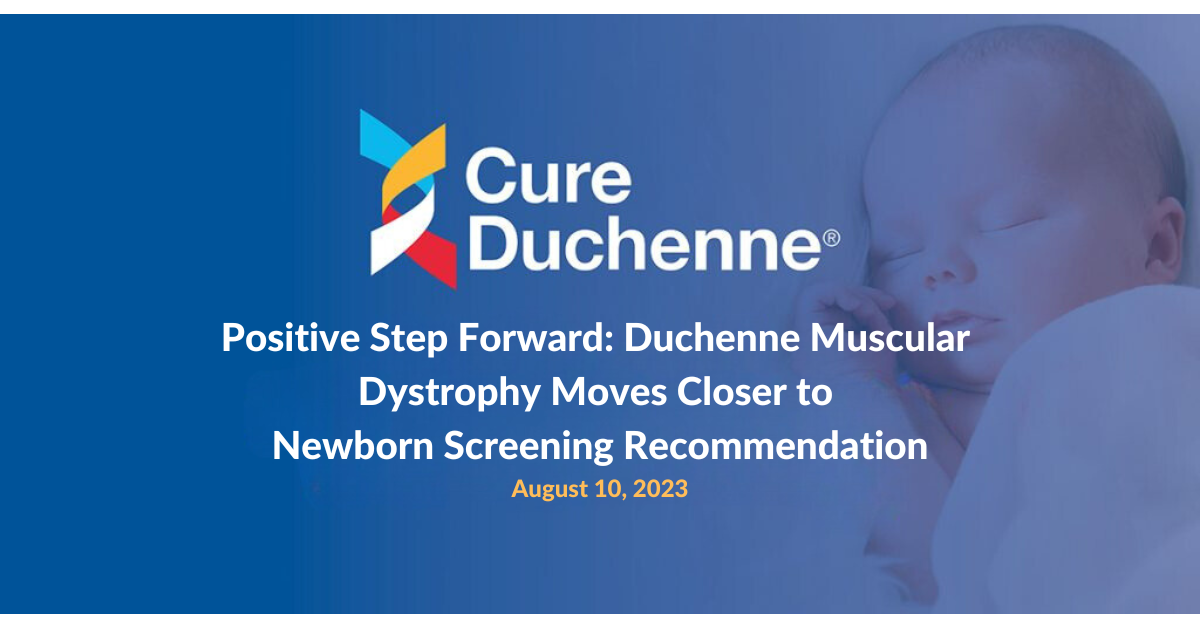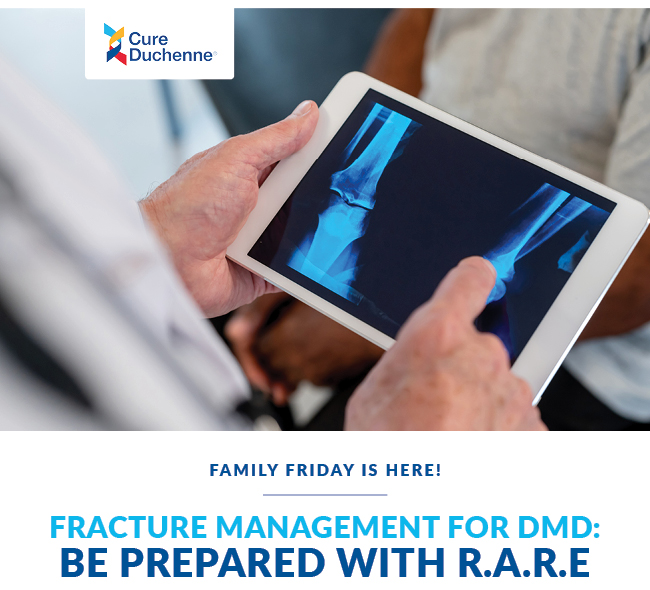Duchenne Muscular Dystrophy Moves Closer to Newborn Screening Recommendation

**UPDATE** See the previous blog here for more background:
Nomination package submitted to add Duchenne to the Recommended Uniform Screening Panel (RUSP)]
In a promising development, the Secretary’s Advisory Committee on Heritable Disorders in Newborns and Children (ACHNDC) has advanced the nomination of Duchenne muscular dystrophy (DMD) for inclusion in the Recommended Uniform Screening Panel (RUSP), a list of disorders that are screened for at birth. This is an important step toward identifying individuals with Duchenne earlier, so that care can be started promptly and when it is believed treatments will be most effective. CureDuchenne congratulates PPMD, the nonprofit organization that submitted the application, and MDA, the co-sponsor.
The ACHNDC recently voted to progress the DMD nomination to the “Evidence-based Review” stage, a crucial phase in which the committee delves deeper into the nomination to ensure its readiness for a recommendation to the RUSP. This move has been welcomed by the neuromuscular disease community, including CureDuchenne, which has actively supported and advocated for this step.
A CureDuchenne-funded pilot newborn screening (NBS) program, along with several pilot NBS programs, contributed data to this effort. These programs were critical in showing that a NBS process can be implemented and that the diagnostic tests are effective at identifying individuals with Duchenne.
The CureDuchenne-funded program at Brigham and Women’s Hospital in Boston is led by Dr. Richard Parad, a neonatologist and director of the Newborn Genomic Medicine Program. This program offers an optional Duchenne screening test to all babies born at Brigham and Women’s Hospital. The pilot program results were published in 2021, and since then CureDuchenne has provided additional funds so the program can continue. To date, the CureDuchenne initiative at Brigham and Women’s Hospital has screened more than 11,000 babies.
Why is Duchenne being recommended now?
People may wonder why such a devastating disease as Duchenne is not already on the RUSP, the list of disorders that the Secretary of the Department of Health and Human Services (HHS) recommends for states to screen as part of their state universal NBS programs.
The purpose of newborn screening is to identify life-threatening diseases at birth so that effective treatments can be administered as early as possible. As a function of this goal, the RUSP only supports screening babies for diseases which have effective treatments and can only recommend testing with a proven method for detecting the disease.
There are several FDA-approved treatments for Duchenne, and many more in clinical trials. Thus, the need for individuals with Duchenne to be treated early, when the therapies are likely to be most effective, already exists. In fact, it is expected to increase in the coming years with even more therapies approved.
Any submission for inclusion in the RUSP must also demonstrate that a testing facility can reliably perform an assay (a lab test to find and measure the amount of a specific substance) which indicates an individual may have Duchenne. Up until now, this has been the major roadblock to getting Duchenne on this list. But over the past few years, pilot projects have been launched by PPMD, MDA and CureDuchenne. Each worked independently to build testing programs in New York, North Carolina, and Massachusetts, respectively.
How does NBS for Duchenne work?
All pilot programs begin the analysis with a tiny prick of blood taken from an infant’s heel just after birth to test for elevated levels of creatine kinase, which may indicate the infant has Duchenne. Creatine kinase, which is normally present inside of muscle cells, leaks out of the muscle and into the bloodstream in cases of DMD. However, other diseases may cause elevated levels of CK, so any individual with a high CK upon initial screen needs to be followed up with a genetic test to see if they indeed have Duchenne.
What’s next?
While the nomination’s progression is an important step, the process is far from over. The submission of the Duchenne RUSP package took place in June 2022. The process of incorporating a disease into the RUSP usually takes several years.
The next step will be Evidence-based Review, which involves an external team of specialists who will comprehensively assess Duchenne newborn screening (NBS) and its implications. This group will share their findings during quarterly meetings with the ACHDNC committee. Once all evidence is presented, the committee will conduct a final vote and, if in favor, it will proceed to the Secretary of HHS for ultimate approval.
While the Committee evaluates Duchenne for the RUSP, individual states are taking steps to implement newborn screening (NBS) for the condition. Most states have specific procedures, such as legislative measures or reviews by state advisory boards, to include Duchenne in their newborn screening programs. Ohio has enacted legislation implementing Duchenne NBS for all newborns from 2024 onwards. Similar initiatives are anticipated to be adopted by several other states in the near future.
Additional data will continue to be collected to support this RUSP recommendation, including through CureDuchenne’s program at Brigham and Women’s Hospital, to bolster the evidentiary foundation. We are hopeful that an official committee recommendation will be made to the RUSP in the coming year.




